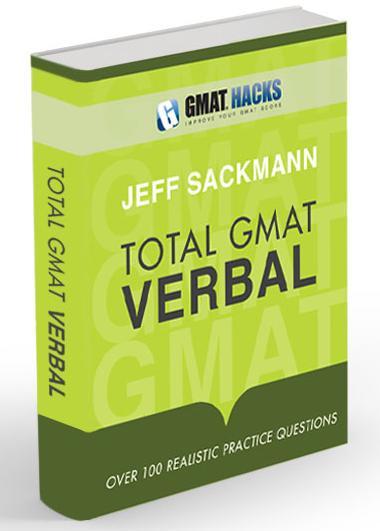
Bookshelf
|
|
Total GMAT Math Jeff's complete Quant guide, on sale now! |
|
|
Total GMAT Verbal Everything you need to ace GMAT Verbal! |
1,800 Practice Math Questions
Buy Jeff's books at Amazon.com

GMAT Official Guide, with IR
OG Math | OG Verbal
OG12 & Quant Rev solutions!
GMAT Question of the Day
Beginner's Guide to the GMAT
GMAT Hacks Affiliate Program

Recent Hacks

Categories
- General Study Tips
- Goals and Planning
- CAT Strategy
- The Mental Game
- GMAT Math Strategy
- GMAT Math Topics
- Mental Math
- Data Sufficiency
- Critical Reasoning
- Reading Comprehension
- Sentence Correction
- Analytical Writing Assessment
- Integrated Reasoning
- IR Explained
- Business School Admissions
- GMAT Prep Resources
- Practice Questions
- Total GMAT Math
- Total GMAT Verbal
- GMAT 111

Should You Take the GMAT Twice?
| You should follow me on Twitter. While you're at it, take a moment to subscribe to GMAT Hacks via RSS or Email. |
Earlier this week, I wrote about how you should decide on a GMAT test date. In that article, I mentioned something I called the "second try safety valve"--the option to take the GMAT a second time, if necessary.
Second Try's a Charm
As I wrote in that article, many people don't achieve their goal scores on the first try. In some cases, that's pure nerves. Even if you are sufficiently prepared to get a 680, the stress of unfamiliar surroundings might prevent you from reaching that goal.
If you take the test again, most of that stress should have dissipated. There's won't be any surprises in the test center, and you'll have a better idea of what kind of mental stamina the GMAT requires.
Can You Really Improve?
Just because I'm writing about this tactic doesn't mean it will work for everyone. The GMAC reports that the average GMAT re-taker experiences a modest improvement, but some of those people spend months prepping between tests. The "average" may not apply to you.
Were you unusually stressed out during the exam? Are you confident that you can master that anxiety if you try again? If so, retaking may be a good idea for you.
Stress isn't the only reason you can expect improvement. As I wrote a couple of years ago, it's important to be able to pinpoint specific weaknesses. Don't blindly expect that another prep course, tutor, or six weeks of study time will magically increase your score. For some people, it won't.
Planning Ahead
It's important to start thinking about that second test date even before you set your first test date. Remember that you can't take the GMAT more than once every 31 days. If you want to have the "second try safety valve," you need to plan ahead.
Schedule your first attempt at the GMAT at least six weeks ahead of your first application deadline. (And don't forget to give yourself plenty of time to study! It defeats the purpose if you rush to study for the first attempt.) Then, if you don't reach your goal, you can schedule another test date for 31 days later and still get your applications in on time.
Natural Variation
One reason that I recommend planning for the possibility of a second test date is that the GMAT isn't a perfect assessment of your skill level on any given day. Depending on the specific questions it gives you, it might be slightly easier or harder when you take the test.
If it were possible to take the GMAT on back-to-back days or back-to-back weekends, I would probably recommend that to my students. That way, you wouldn't have to sustain your study efforts for another month after the first attempt. But since the GMAC doesn't permit that, we have to settle for the 31-day compromise.
Study Maintenance
In those 31 days, keep studying, and remember to spend some time on every aspect of the GMAT. Even if you got a fantastic score on one part of the test, continue to review that content.
If you've identified some content areas in which you are weak, obviously you'll want to hone in on those. And if stress was the problem, more practice tests (under conditions as test-like as you can make them) are in order. But regardless of how you spend your time, don't neglect any part of the exam.
On the Application
Many business school applications simply ask for one GMAT score. A large percentage of top schools take only your best score. In other words, you have nothing to lose by retaking the test, except for some study time and the $250 exam fee.
If you get a higher score the second time around, no one ever has to know about your earlier attempt. If you don't manage to improve your score, you're no worse off than you were before you retook the test.
I hope that you get the score of your dreams on your first try. But be realistic: Plan for the possibility that your dreams might take a bit longer to materialize.
About the author: Jeff Sackmann has written many GMAT preparation books, including the popular Total GMAT Math, Total GMAT Verbal, and GMAT 111. He has also created explanations for problems in The Official Guide, as well as 1,800 practice GMAT math questions.
 |
Total GMAT Verbal
The comprehensive guide to the GMAT Verbal section. Recognize, dissect, and master every question type
you'll face on the test. Everything you need, all in one place, including 100+ realistic practice questions. |